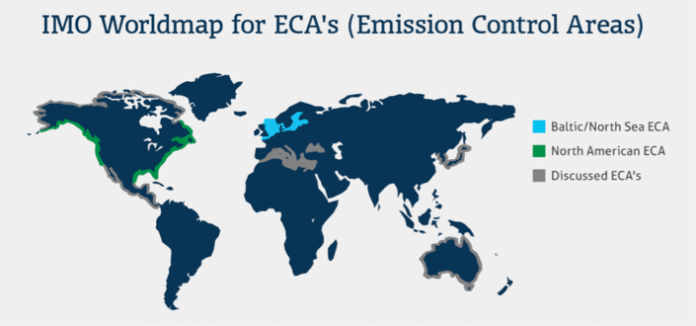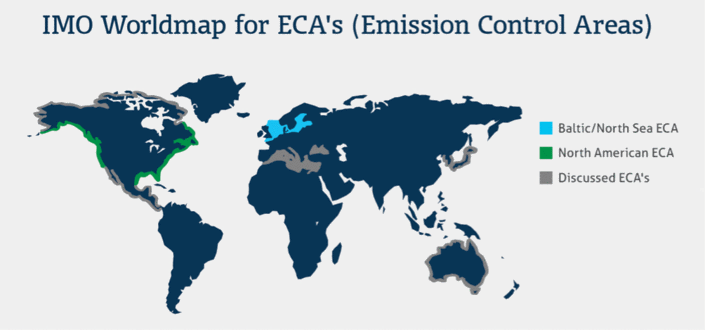
 The 2015 fuel sulfur standard of 0.10 percent fuel sulfur (1,000 ppm) is expected to reduce particulate matter (PM) and sulfur oxides (SOx) emissions by more than 85 percent from today’s levels to be met through fuel switching. In most cases, ships already have the capability to store two or more fuels. However, to meet the 1,000 ppm fuel sulfur requirement, some vessels may need to be modified for additional distillate fuel storage capacity. As an alternative to using lower sulfur fuel, ship operators may choose to equip their vessels with exhaust gas cleaning devices (“scrubbers”). In this case, the scrubber extracts sulfur from the exhaust.
The 2015 fuel sulfur standard of 0.10 percent fuel sulfur (1,000 ppm) is expected to reduce particulate matter (PM) and sulfur oxides (SOx) emissions by more than 85 percent from today’s levels to be met through fuel switching. In most cases, ships already have the capability to store two or more fuels. However, to meet the 1,000 ppm fuel sulfur requirement, some vessels may need to be modified for additional distillate fuel storage capacity. As an alternative to using lower sulfur fuel, ship operators may choose to equip their vessels with exhaust gas cleaning devices (“scrubbers”). In this case, the scrubber extracts sulfur from the exhaust.
Currently all vessels operating in the US and Caribbean ECAs will need to switch from using 1.0 percent sulfur heavy or intermediate fuel oils (HFO/IFO) to compliance with 0.10 percent Low Sulfur Fuel Oil (LFSO) requirements that go into effect on January 1, 2015. This performance standards approach affords the greatest flexibility for ship owners and operators, who may choose to comply either through the use of low sulfur distillate fuel and/or the use of scrubbing or other technology.
For those ships choosing to use low-sulfur distillates, a situation where two fuels are carried onboard will exist. This is already a common practice for those vessels regularly trading in California. The California Air Resources Board (ARB) has required and enforced the use of distillate fuels at or below 0.10 percent sulfur in Regulated California Waters (RCW) since January 1, 2014.
Guidelines for compliance and enforcement including equivalent controls, exceptions, and/or exemptions are explained in detail in the following U.S. Coast Guard (USCG) Policy Letter dated July 25, 2012: http://goo.gl/VAuWby.
Those owner/operators who are unable to obtain compliant fuel are required to submit an electronic fuel oil non-availability report (FONAR). Electronic Fuel Oil Non-Availability Disclosure Portal Instructions can be found at: http://goo.gl/POUgZm.
Additional information on this topic can be found at: www.epa.gov/otaq/oceanvessels.htm.
While we continue to monitor this important issue, we have not received any new information or indication from the Environmental Protection Agency (EPA) or USCG regarding postponement of this requirement. In fact, a notice regarding enforcement was recently issued on the Coast Guard Blog for Maritime Professionals - http://goo.gl/R3YjbI.
Source: Witt - O'Briens












